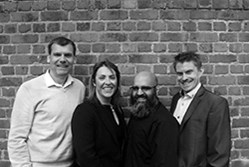
We are delighted to announce that Triangle Architects has recently become an Employee Ownership Trust, with four directors taking the helm following a full transfer of share ownership from the founding directors.
The EOT will ensure that all the staff will now own the practice collectively and will, in addition, provide all of them with a platform to engage with the board of Directors on the running of the business and its performance. It is an ownership model already well established within the architectural profession.
Triangle is now wholly owned by its staff, but the founding partners, David Ward and Tim Wallbank, will remain on hand as trustee directors to offer support throughout the succession process.
The new board of directors boast collective experience in excess of 60 years, and all have already worked within the practice, for much of their professional lives. They are: Mark Trayhorn, Harry Randhawa, Barry Murphy and Alison Duxbury.
Speaking of the handover, Barry Murphy, said: “Our objective has always been to achieve effective, successful and sustainable design solutions that enhance the lives of the people we serve. Central to achieving this ambition has been our commitment to creating a happy and fulfilling workplace for our staff.
“Fifteen per cent of the UK’s top 100 architectural practices have adopted the employee ownership model, so it’s a proven method of ownership within the sector and one we wholeheartedly believe will work for Triangle.”
David Ward, founder trustee director, added: “The employee buyout continues our legacy of helping people to feel valued, understood and supported and we’re tremendously excited to be a part of guiding Triangle’s future success.”
Deb Oxley OBE, CEO of the Employee Ownership Association, concluded: “We congratulate Triangle Architects on its transition to employee ownership.
“By widening ownership of the business to its employees Triangle Architects is securing the future of the business, including its ethos, values and employees, while rooting itself locally for the longer term to the benefit of the community(ies) which it serves.”

